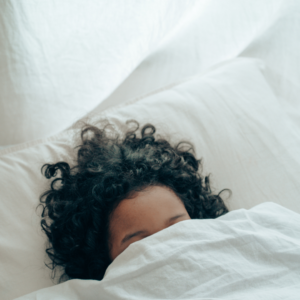Here’s why!
Let me tell you a story.
Michelle was struggling with her sleep. She was exhausted, but couldn’t fall asleep when she went to bed at night. So she’d lie there staring at the ceiling, angry and frustrated.
And finally, when she would fall asleep, she wouldn’t be able to stay asleep. Almost every night she was awake in the middle of the night. Sometimes she’d be able to fall back to sleep, but other times she couldn’t. And she’d lie there again – angry and frustrated.
Anytime she’d see something that promised to cure her of her insomnia, she’d get really excited. Maybe this was the solution she’d been waiting for!
So, she would try all of the things: meditation apps, essential oils, white noise machines, supplements, and more.
They would work for a little while, or maybe not at all.
And the cycle would continue.

If this sounds familiar to you, you are NOT alone. This describes most people.
The reality is that when you feel awful, you’re willing to try almost anything. You’re exhausted, you’re irritable, you can’t seem to get on top of everything, and you don’t feel like yourself.
Anything that might be able to get you out of that rut is absolutely worth trying.
Some of these solutions do work, for some people. But most of the time, they don’t really have much of an impact.
Why Do These Solutions Work Sometimes?
The reason these things work for some people is that the solution to some people’s sleep challenges is actually relatively simple. Magnesium deficiency is a real thing, and all sorts of symptoms accompany that deficiency. Sleep disruption is one of those. So if you have a magnesium deficiency, but everything else is in order, your sleep will likely improve taking a magnesium supplement.
If you are very sensitive to light, installing blackout curtains in your bedroom might be just the trick you need to ensure a great night’s sleep.
If you work on incorporating a mindfulness practice every day, that might be enough to lower your stress levels to improve your sleep.
Why Do These Solutions Usually NOT Work?
Unless your real reason for struggling with sleep is relatively simple, the most common solutions don’t actually get to the root cause of your sleep issues.
Sleep is very complicated.
The truth is that the root cause of most people’s sleep challenges is several things.
But getting to the root cause of whatever symptoms you’re experiencing, whether it’s sleep issues, digestive issues, or a rash on your arm, is how you’re actually going to solve the problem.
Here are the typical root causes of most people’s sleep disruptions.
- Circadian rhythm disruption – For many of us, our circadian hormones are not doing what they should be doing. There are a whole bunch of hormones that are involved in getting you to sleep every night and waking you up in the morning. And for lots of reasons, it’s not uncommon for those hormones to be out of sync.
- High stress – Stress is one of the most impactful things that affects our sleep. The stress hormone cortisol is what wakes us up. And that can happen in the middle of the night, or too early in the morning.
- Sleep habits – We’ve all been tempted to stay up and watch just one more Netflix episode, but in doing so it can throw our sleep habits off big-time. It’s easy to push through the feeling of being tired because you have more things to do, or you just feel like relaxing, but keeping a consistent bedtime (and bedtime routine) is a really important part of our sleep habits.
- Hormones – Hormones play a role in everything in our lives, and sleep is no exception. We rely on a ton of different hormones to help us fall asleep and wake up. In women, estrogen and progesterone are two key hormones that are very much tied to sleep. As we enter perimenopause, and those hormones start to decrease, it gets harder for us to stay asleep and fall asleep. But they aren’t the only hormones connected to sleep. Stress hormones, thyroid hormones, even melatonin (which is a hormone) all impact sleep. If you think hormones are playing a significant role in impeding sleep, your best bet is to have a chat with your doctor about which hormones might be at play, and how to test for them.
- Age – as we get older, sleep gets more difficult. There are a few reasons for this, and there isn’t much we can do about it, but this is why as we age, making sure we have all of the other things under control (circadian rhythm, stress, habits, and hormones) will help minimize the age-related sleep disruption.

There Is Good News!
It is possible to address ALL of these underlying root causes of sleep disruption. You might need to address more than one of them at a time, but that is also possible.
And the better news is that with some knowledge, some tools, and some support, getting to the root cause of your sleep challenges is 100% doable. And it doesn’t need to be overwhelming. So if you have tried absolutely everything for sleep, and nothing really helps, book your free sleep assessment call here. This free 45 minute call will give me a chance to figure out what’s going on with your sleep, and how you can get started to finally take control of your sleep, and amplify your energy – for good!
